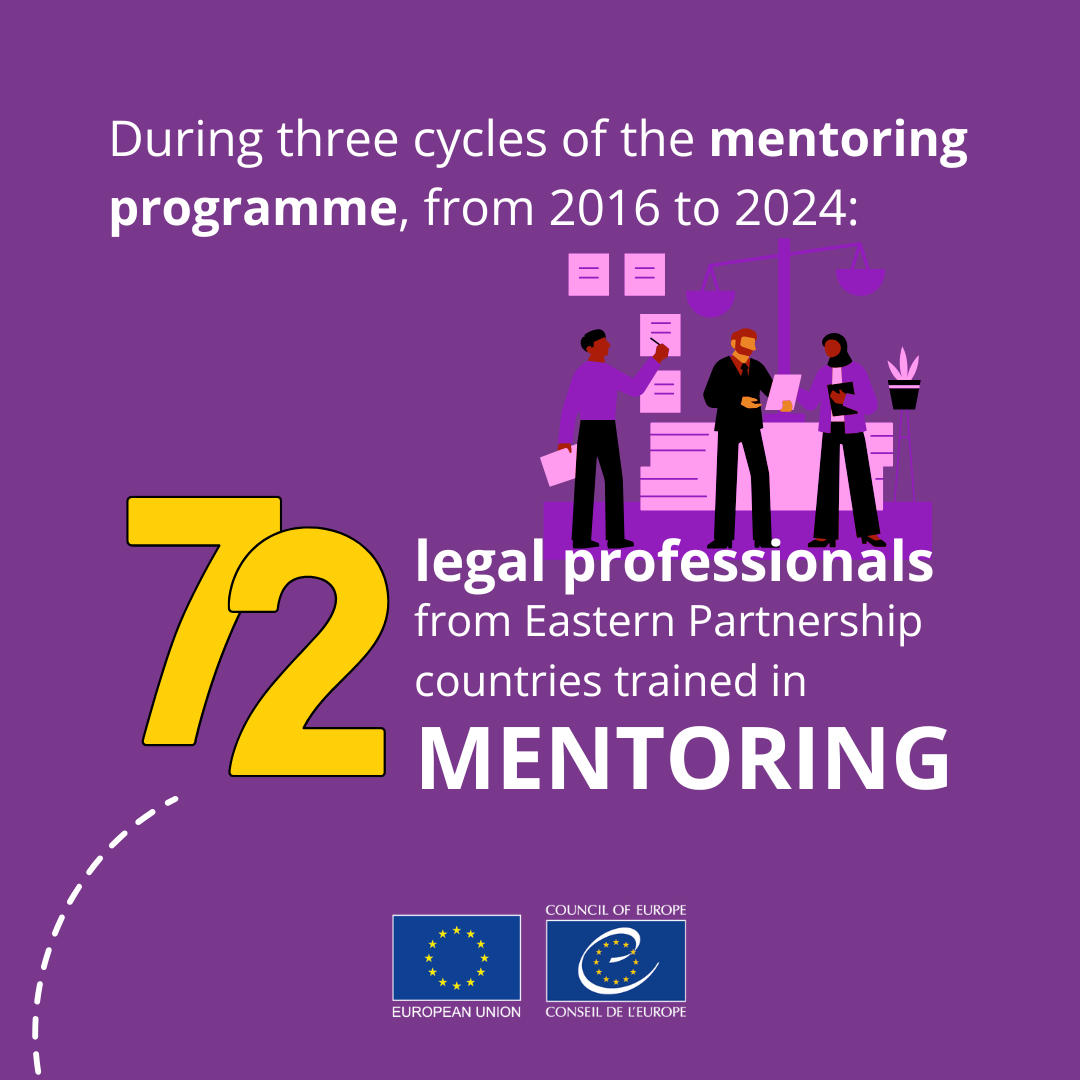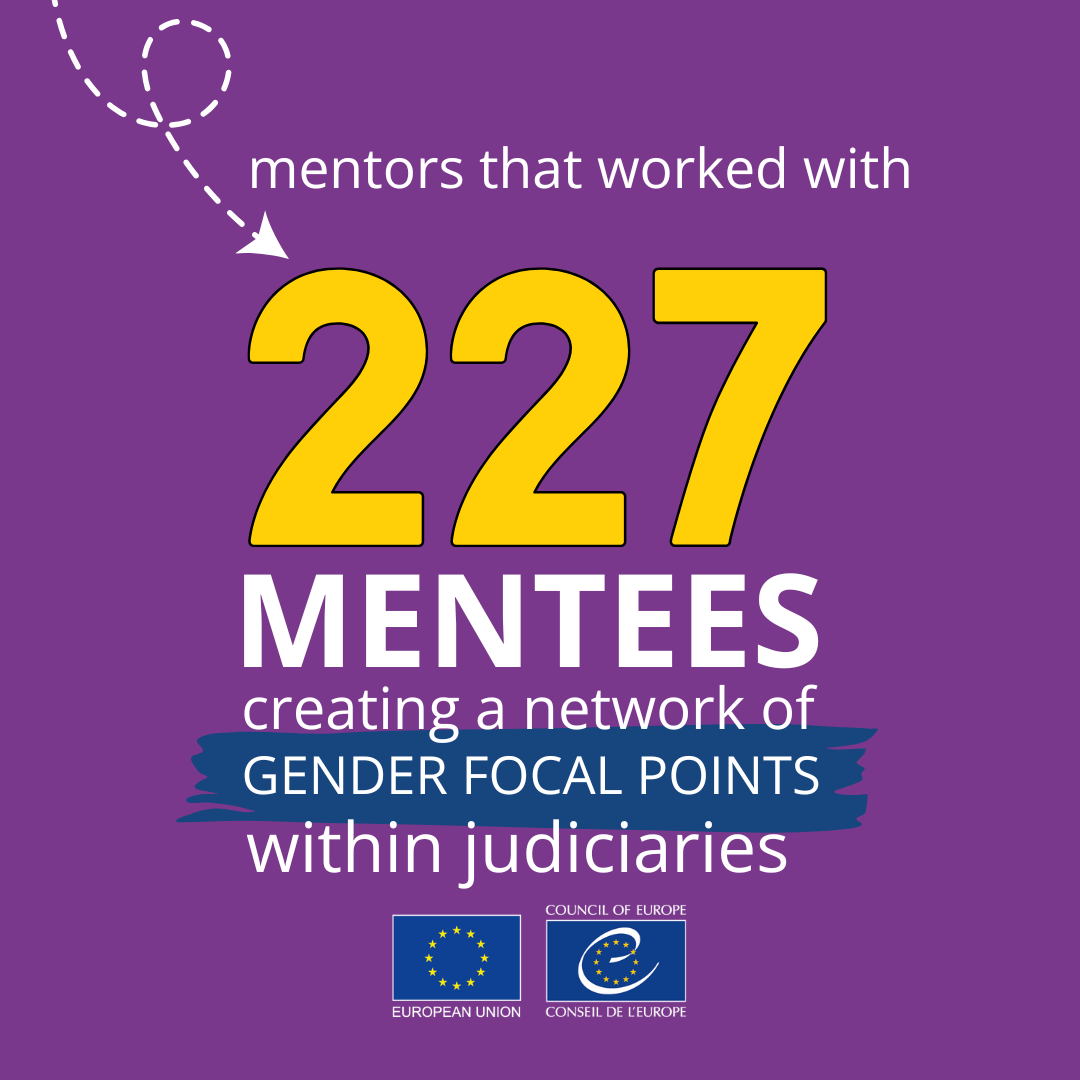Mentoring programme on women's access to justice for legal professionals in the EU Eastern Partnership countries
 What is the mentoring programme?
What is the mentoring programme?
Mentoring is a methodology aiming to empower legal professionals, judges, and prosecutors, to advance women’s access to justice. Through peer-to-peer learning, mentees are supported by experienced mentors - their peers from the ranks of judges and prosecutors, recruited by judicial training institutions – to explore innovative approaches and address gender-based inequalities they encounter in their practice. By fostering open dialogue and promoting mindset shifts, mentoring can create meaningful change taking a different approach from the one used in traditional classroom teaching.
The mentoring programme is implemented in Armenia, Azerbaijan, Georgia, the Republic of Moldova, and Ukraine.
For more information, visit the web page of the Partnership for Good Governance regional project “Women's Access to Justice: implementing Council of Europe gender equality and violence against women standards”.
Download the guide for developing a mentoring programme on women’s access to justice for legal professionals in English. Also available in: Armenian | Azerbaijani | Georgian | Romanian | Russian | Ukrainian
 What have we achieved?
What have we achieved?


 What are the greatest challenges by women as justice users?
What are the greatest challenges by women as justice users?
- Lack of gender-sensitivity and awareness among legal professionals.
- The influence of harmful gender stereotypes and bias in the exercise of legal professions.
Women face many obstacles in accessing justice, despite formal commitments in the Eastern Partnership region, as in most Council of Europe member states. These barriers rarely reflect problems with the content of laws and policies formally upheld but rather from procedures and practices in implementing them.
 And in the Western Balkans?
And in the Western Balkans?
Following the success of the first two cycles in the Eastern Partnership region, the mentoring programme has been implemented in the Western Balkans since 2023 under the EU and Council of Europe joint programme Horizontal Facility for the Western Balkans and Türkiye.
For more information, visit the web page of the Horizontal Facility regional programme "Women’s access to justice in the Western Balkans".
 Testimonials
Testimonials
Read more about the experiences and results obtained by participants to the mentoring programme:
“In delivery of justice, we began to look at old problems in a new way and we were able to develop concrete solutions for advancing gender equality in court practice.” - Karen Zarikyan, Judge of the Administrative Court, Armenia
“I feel empowered as a mentor on women’s access to justice, I possess the necessary set of skills, and I plan to continue mentoring colleagues on gender equality standards.” - Vusala Bakhishova, judge of the Supreme Court of Azerbaijan
“Participants of the mentoring programme were able to understand the urgency of the need for a gender-sensitive approach to cases of violence against women, domestic violence, as well as to identify their own impact on access to justice for women.” – Medea Tsiramua, Prosecutor, Georgia
"The mentoring is first about developing further legal skills. Then, about increasing confidence. Finally, the mentoring experience is about raising awareness on gender equality....and how gender stereotypes affect judicial processes, leading prosecutors to advocate for changes within the Moldovan judiciary and promote gender sensitivity.” - Olga Marandici, Advisor to the Director of the National Institute of Justice, Republic of Moldova
"The mentoring programme is also the creation of an appropriate psychological atmosphere in the court room - an atmosphere of support, empathy and understanding for victims of violence." – Olena Tanasevych, judge of the High Anti-Corruption Court, judge of the Pechenihy District Court of the Kharkiv Region, Ukraine



